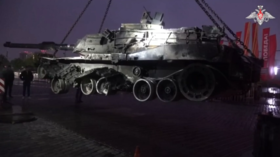The exhibition of trophies seized amid the Ukraine conflict has attracted scores of visitors, footage from the scene shows
An exhibition featuring assorted Western-supplied military hardware captured during the Ukraine conflict opened in Moscow on Wednesday.
The heavy armor has been put on display outside of the city’s Victory Museum and will remain in place for the whole month of May. The opening of the exhibition attracted large crowds, with drone footage showing the location packed with people.
The exhibition features a total of 32 vehicles seized from Ukrainian forces, primarily armor supplied by Kiev’s Western backers, as well as a handful of Ukrainian home-grown designs. The display also includes assorted small arms, grenade launchers, and other military equipment captured amid the hostilities.
The exhibits of Western-supplied weaponry include some of the most advanced armor received by Ukraine during the conflict, such as a German-made Leopard 2A6 and US-made M1A1 SA Abrams main battle tanks. The former was captured largely intact, while the latter was reduced to a burnt-out husk.
Lighter vehicles include an advanced Swedish-made CV90, German-made Marder infantry fighting vehicles, as well as other pieces, including assorted mine-resistant ambush-protected vehicles.
The Ukrainian-made pieces include various armored personnel carriers and armored cars, as well as several rare pieces, including a local upgrade of a Soviet-era T-72 tank, the AMT model. The exhibition also features a unique piece of hardware – the infamous Azovets armored vehicle.
The contraption, a heavily uparmored T-64 tank lacking its gun turret with two smaller modules with autocannons and anti-tank missiles installed instead, was created by engineers linked to the neo-Nazi Azov regiment back in 2015 and advertised as the ultimate vehicle for urban warfare. However, the Azovets promptly triggered a scandal given the ballooning costs of the conversion, which reached $5 million, and questionable design. For instance, the vehicle ended up lacking any stock observation devices and instead relied on a system of door phone cameras instead.
The controversial vehicle vanished without a trace in 2016, presumed to have been stolen by Azov members. This was likely the case, given that it was recently unearthed by the Russian military at a defunct base of the neo-Nazi unit near the city of Mariupol.
You can share this story on social media:




